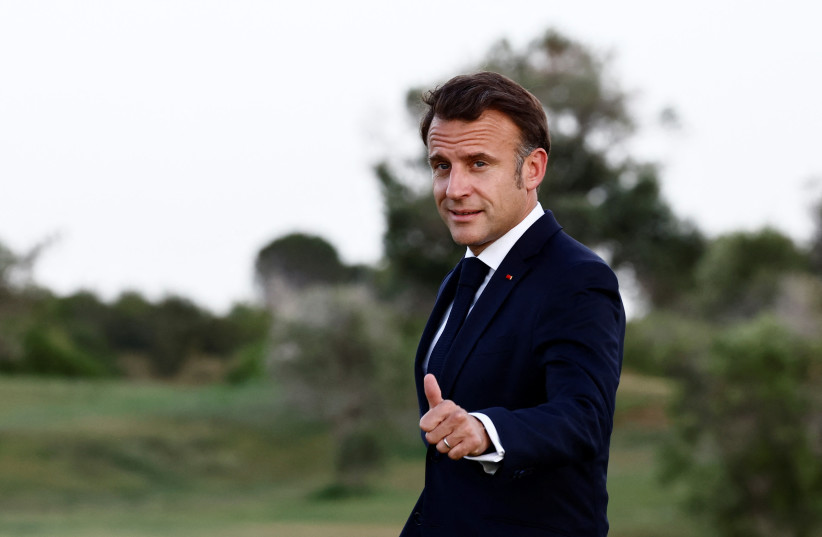France not hostile to Israel, Gallant doesn’t decide diplomacy – Foreign Ministry
Israel hasn’t rejected French President Emmanuel Macron’s proposal for a trilateral summit over tensions in the north, a source in Israel’s Foreign Ministry said.
The source attacked Defense Minister Yoav Gallant for rejecting the plan and demonizing France which the source described as a strong and steadfast ally of Israel.
“The French are very angry about this,” another source in the Israeli Foreign Ministry told The Jerusalem Post, explaining that they feel as if Gallant is “accusing them of antisemitism.” The source added that this feeling was coming from those close to Macron.
The source accused Gallant of usurping diplomatic roles reserved for the Prime Minister and the Foreign Minister, alongside his own. Gallant already riled those within the Likud party, last week when he voted against the government’s draft law in the Knesset.
The idea of a trilateral process to find a diplomatic solution to the cross-border violence between the IDF and Hezbollah in Lebanon that would also involve the Lebanese government was raised when French Foreign Minister Stéphane Séjourné visited Israel in April, the source said.

Israel is interested in the proposal but it’s still in its early stages, the source said, explaining that the Lebanese government would also have to be involved and the US still has to formally accept it, the source explained.
Another Foreign Ministry source, who “disapproved” of Gallant’s remarks said that “Beyond the differences of opinion that exist between Israel and France, the statements against France are incorrect and out of place.”
In April France was one of five countries whose armies took to the skies to protect Israel from Iranian missiles, the source said. It also leads an “aggressive line in regards to sanctions against Iran and its missile and [armed drones] within the European Union,” the source explained.
France, the source said, was also involved in the decision of the “International Atomic Energy Agency Board of Governors to advance the sanctions process against Iran’s nuclear program.”
On top of that the “authorities in France are actively fighting the scourge of anti-Semitism and protecting the Jewish communities within its country,” the source said.
“The Ministry of Foreign Affairs will continue to fight to protect Israel’s interests on the northern border against all relevant parties, the source stressed.
Diplomatic solutions to Hezbollah attacks
Tensions, however, have been high between Paris and Jerusalem, since France for the first time banned Israeli defense companies from participating in the industry’s largest global arms exhibit, called the Eurosatory, which is set to be held in Paris on the 17th through the 21st of this month.
Still French President Emmanuel Macron on Thursday announced that the three countries had agreed to work together to find a diplomatic solution to the escalating violence, which since October 7 has prevented scores of thousands of Israelis from living in their homes along the northern border.
Gallant said on Friday that “Israel will not be a party to the trilateral framework proposed by France.”
“As we fight a just war, defending our people, France has adopted hostile policies against Israel,” Gallant stated.
“In doing so, France ignores the atrocities committed by Hamas against Israeli children, women and men,” he added.
“With the United States we agreed on the principle of a trilateral (contact group), Israel, the United States, and France to advance on the roadmap that we proposed and we will do the same with the Lebanese authorities,” Macron told reporters on the sidelines of the G7 summit in Italy.
Hezbollah, which has ruled out ending hostilities until there is a ceasefire between Israel and the Iranian proxy group Hamas in Gaza, said it had launched rockets and weaponized drones at nine Israeli military sites in a coordinated attack on Thursday, ramping up hostilities on Lebanon’s southern border for the second consecutive day.
A senior French official said there was an urgency for the United States and France to step up their efforts given the dangerous escalation.
France and the United States have in recent months worked to try to defuse tensions with Paris submitting written proposals to both sides aimed at stopping worsening exchanges between them on the border between Lebanon and Israel.
France has a special relationship with Lebanon, because it administered the country between World War I and World War II, after the collapse of the Ottoman Empire. US Special Presidential Coordinator for Global Infrastructure and Energy Security Amos Hochstein has also been pushing for a diplomatic resolution.
Israeli National Security Advisor Tzachi Hanegbi and Strategic Affairs Adviser Ron Dermer are slated to travel to Washington next week to hold talks with top US officials about Iran and its wars with the two proxy groups, Hamas and Hezbollah.
Reuters contributed to this report





Comments are closed.